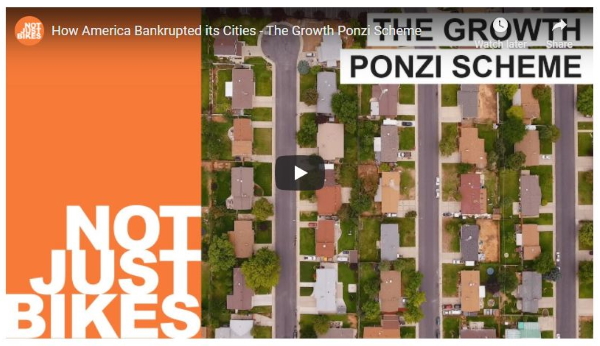Wow, this video is really amazing. I ran across it on Shirley Márquez Dúlcey’s Facebook feed and then spent the last 30 minutes listening to this guy’s podcasts. They’re short and smart. He says things about American-style cities that resonate deeply for me.
The narrator of the NotJustBikes podcast describes himself as a guy who “copies Strong Towns’ homework” or (from another issue) “reviews restaurants where the lettuce doesn’t taste funny.” In this video, he is processing for your pleasure and education the work of a group called Strong Towns, who have their own podcasts.
I don’t have time to listen to any more NotJustBikes podcasts right now, doggone it, I should be writing a book. Nor can I play hookey to check out Strong Towns. Not until I get in my two thousand words.
But I had to share this podcast and my immediate reaction to it.
I spent my first 10 years in the big city. Then my parents moved to the suburbs “because of civil unrest.” <comment about the racism inherent in their motivations redacted> Overnight our lives changed for the worse: my mother got crazier due to her isolation (no car), our school was blandly white and inferior in educational quality (despite our parents’ conviction that it would be better no really well at least it was safer and whiter), our connections to our neighbors dropped to zero and stayed there (in spite of them being all white), and the blandness and whiteness meant that my mother and my brother and I stood out as “weird” and got bullied by both children and adults, including teachers and ministers, for, say, owning and reading too many books, for wearing hand-me-down clothes, for having big vocabularies, for not going to church, for being too poor to own a second car. What hadn’t caused a blink in the city became grounds for shunning in the safe, rich, safe, white, safe suburbs.
Thank goodness my maternal grandparents were maniacally eco-minded, covert nature-worshippers, lifelong country-dwellers by choice … and had a car. My grandmother could fetch us out of our safe little house and take us to parks and forest preserves where we could breathe.
The way we ran around our neighborhood in the city, and later in our safe white little suburb, and the forest preserves anywhere within sixty miles around, would, today, have got us taken away from our parents by the state.
One look at the friends we had in the city would have had the safe white moms in our safe white suburb pulling their own children closer to their skirts.
My mom, one of the poorest in our suburb, was not the poorest mom in the city. In the city, she could take her kids on free days to museums and zoos, and any day to parks and the beach, all for the cost of bus fare. In the city, the library bus parked within walking distance, several times a week, and it lent us all the books we could carry, for free. We never felt left out of the activities of our community.
In our suburb, our mom had to wait for our dad to come home from work so he could drive us to the library. He hated to drive.
Our dad didn’t mind the suburb, but then, he drove to the commuter train, left the car at the station, and worked in the city. He spent as much of his off-work time there, as well. When he said “The goddam mayor,” he meant Mayor Daley, not the mayor of our clean, white, safe little suburb. He only slept at home. Once he retired to the suburb, he had to drive to a bar, which put a considerable crimp in his social life. Slowly he began to appreciate our mom’s dissatisfaction. But they lived in that suburb for the rest of their lives.
Since moving away from that first suburb, I have lived in a bunch of cities and suburbs. At this point, trying as the city can sometimes be, I wouldn’t give it up for anything.

